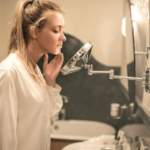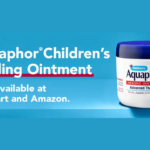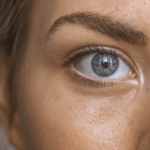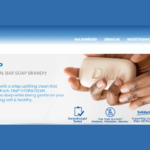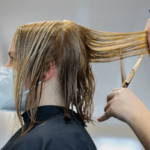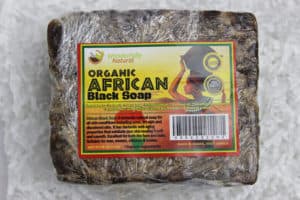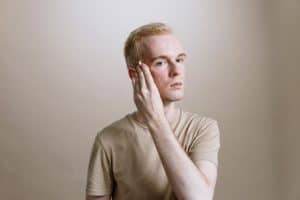There are many ways to treat acne, but unfortunately, there is no way to make it go away immediately. It can be frustrating, like watching paint dry when waiting for acne to heal and go away. Why does acne take so long to heal?
Acne takes so long to heal because there are many possible underlying causes that need to be addressed, including:
- Genetics
- Hormonal imbalance
- Skin type
- Clogged pores
- Stress
- Irritants
- Diet
You have to identify both the specific cause of your acne so that you can apply the appropriate treatment that you need. You can test different treatments until you determine what is causing it.
Read on to learn about why it takes so long for acne to heal and how to make it heal faster!
Also, for an excellent bamboo scrub that prevents acne breakouts, take a look at the Goldfaden MD Doctor’s Microdermabrasion Body Scrub:
Click here to see it on Amazon.
Why Does Acne Take so Long to Heal?
As mentioned, acne results from different factors and causes. When you notice acne on your face, your initial reaction is to apply self-care remedies. But then, as long as you don’t know the root cause of your acne, your self-care remedy might not work that well.
In fact, it might not work for you at all. It’s possible that you’re applying the wrong treatment. Worse, it might aggravate your skin condition. In this case, you have to seek professional medical help from a doctor or dermatologist.
Of course, your dermatologist won’t be able to cure your acne outright. They also have to pinpoint the exact cause of your acne. But because of their expertise, they will be able to address this more quickly than you do.
When you consult your dermatologist, you have to cooperate with them. It’s not easy to identify the root cause of acne.
That’s why if they give you specific instructions, you have to strictly follow them all. That way, it’s going to be easier to discern the causes of your acne. Then, you’ll eventually be given proper treatment.
Acne Causes That Need to Be Addressed to Heal It Faster
To determine why it takes so long to heal your acne, you or your doctor must assess the following possible factors. Once you know the factors and causes, you can address them, and your acne will heal faster.
1. Genetics
If both of your parents have acne, there’s the likelihood that you’ll also develop acne. In fact, even if only one of your parents experiences it, there’s still a possibility for you to develop it.
Genetics can also determine how fast or slow it takes for your acne to heal. Please don’t blame your parents, though. There are other factors that can be at play, and you can get under control.
2. Hormonal Imbalance
Hormonal changes are mostly experienced by:
- Teenagers
- Females
- People under medication
Everyone can develop acne. Even the older folks can. But more than anyone else, it’s most likely to develop among teenagers during their puberty stage. It’s also common among women in relation to pregnancy or the use of contraceptives.
When a hormonal imbalance occurs, the body produces excessive sebum. Sebum is the secretion by the sebaceous glands of oil. If your body produces excessive oil, there’s a tendency for hair follicles to clog. Then, this might cause acne.
To better control your hormones so that your acne doesn’t take so long to heal, you can make sure to manage stress by getting enough sleep and exercising. You can also make sure to follow the right diet that includes fiber, healthful fats including omega 3s, and little to no sugar.
3. Skin Type
If you have oily skin, it is easy for your pores to get clogged, which causes acne and makes it take longer to heal. To avoid this, make sure to exfoliate your skin no more than 3 times a week with a gentle exfoliant.
See the Red Flower Oshana Gingergrass Bamboo Scrub on Amazon for a scrub that feels like the spa. It exfoliates without burning your skin so as to make the acne heal faster.
Click here to see it on Amazon.
If you have sensitive or dry skin, you will want to use a moisturizer that will keep your skin hydrated without clogging your pores.
See the Eminence Coconut Age Corrective Moisturizer, which not only moisturizes but balances your skin’s pH, which is essential for healing and preventing acne:
Click here to see it on Amazon.
4. Clogged Pores
Clogged pores (also referred to as hair follicles) are actually clogged by dead skin cells and oil. That’s why if your body produces excess oil, there’s a tendency for it to clog the pores. It will also cause dead skin cells to get stuck. Hence, new skin cells will find it difficult to regenerate.
Clogged pores worsen due to your exposure to bacteria. Bacteria infects and inflames your skin — more so, your pores. This occurrence then causes pimples.
Clogged pores also cause the appearance of whiteheads and blackheads. This occurs because of the congestion brought about by both the oil and bacteria.
As mentioned earlier, ensure to exfoliate properly to keep your pores clean and unclogged. Just don’t overdo it and aggravate your skin. Exfoliate your skin no more than 3 times a week and use a gentle chemical exfoliation product. Avoid physical exfoliation with a brush or sponge.
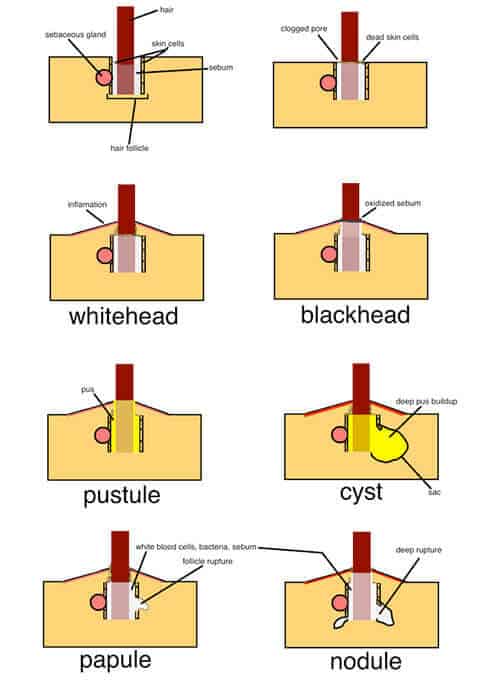
5. Stress
As mentioned, to keep your hormones balanced, it is important to manage your stress through proper sleep and exercise. Acne doesn’t mainly develop because of stress. It’s just that if you already have acne, stress can make it take longer to heal and maybe even make it worse.
6. Irritants
Your acne can also take a longer time to heal if it is exposed to irritating clothing or gear rubbing against it. Some examples of items that cause friction and irritate the skin are:
- Backpacks
- Collars
- Helmets
- Phones
Sweat is also a common irritant and can prolong the acne, preventing it from healing. To avoid a build-up of sweat, stay cool during the day with fans or A/C on. Also, properly wash and cleanse your face before bed to remove the day’s build-up of sweat, grime, and toxins.
7. Diet
Diet may be one of the top things you can change to make your acne heal faster. The truth is, if you already have acne, there are types of food that will worsen your skin condition. These types of food include chips, bread, milk, and refined sugar. Ensure to include in your diet fiber, omega 3 fatty acids from sources like salmon, and even take a multivitamin to cover your bases.
See Thorne Research Basic Nutrients 2 a Day on Amazon for a complete multi-vitamin/mineral supplement with 2000 IU vitamin D, also vitamin K1, K2, and much more.
Click here to see it on Amazon.
Acne Symptoms
Just like how acne has different causes, people with acne also experience different symptoms. These include the following:
- Tiny painful lumps felt under the skin
- Big painful lumps felt under the skin
- Pimples
- Papules or small bumps on the skin
- Blackheads
- Whiteheads
These symptoms vary with how long they take to heal. The redder and bigger the bump, generally, the longer it will take to heal.
Acne develops on areas of the skin where most oil glands are. These include the:
- Face
- Shoulders
- Upper back
- Chest
- Forehead
These different areas where the acne can develop also vary with how long they take to heal. Some parts may heal faster than others. Follow the tips in this article to find overall health. This will make the acne on your whole body heal faster and prevent it from spreading.
See the below video for a demonstration of how acne forms and how it heals:
How to Make Acne Heal Faster
When acne develops, your initial reaction is to apply over-the-counter remedies. You’ll also most likely try to avoid certain types of food to prevent it from aggravating. After months — and even years — of self-remedy, you notice that your acne issue is not addressed.
If the acne is still taking a long time to heal, it’s best to consult a dermatologist to speed up the healing process. Your dermatologist will help you with the following:
- Pinpoint the cause of your acne
- Prevent your acne from further damaging your skin
- Heal your scars
- Control your acne moving forward
There are three different types of prescriptive treatments. These include:
- Topical medication
- Oral medication
- Specific Acne Therapies
1. Topical Medication
There are several subtypes under this type of medication. These include:
- Retinoids or retinoid-like prescription drugs. These can be in the form of lotions, gels, creams, or drugs. They contain tazarotene, adapalene, and tretinoin, among others. They prevent pores from clogging.
- Dapsone. This medication is in the form of a gel. This is usually prescribed to adult women. But there are patients who experience side effects such as dryness and redness of the skin.
- Salicylic acid and azelaic acid. These medications usually come in the form of a cream. They are used to treat acne because of their antibacterial properties. Azelaic acid is found in animal products and whole grains. There are some patients who experience side effects such as minor skin irritation and skin discoloration.
- Antibiotics. Topical antibiotics are usually mixed with benzoyl peroxide. Such combination decreases the possibility for antibiotic resistance to occur. Applying antibiotics help kill excessive bacteria in the skin.
2. Oral Medication
Oral medications include the following:
- Isotretinoin. This is a strong drug. It’s usually prescribed to patients with severe acne. While it’s proven to be an effective drug, some patients may experience serious side effects. Some of which are mental depression, ulcerative colitis, and birth defects. Dermatologists who prescribe this drug always closely watch their patients.
- Anti-androgen agents. This is commonly prescribed among adolescent girls and women. They usually try this when antibiotics seem to be ineffective. But it also has side effects. Possible side effects include dysmenorrhea and tenderness of the breasts.
- Oral contraceptives. There are contraceptives that are also used as acne therapy. These are prescribed to women. Again, these drugs have side effects too such as nausea, breast tenderness, and weight gain.
- Antibiotics. Oral antibiotics are prescribed for a short time, otherwise, the patient might experience antibiotic resistance. These drugs also have side effects such as dizziness and upset stomach.
3. Therapies
Therapies for acne are also available. Some of these are:
- Steroid injection. This is performed by injecting steroids on cystic and nodular lesions. This therapy is proven to provide immediate improvement to the skin.
- Blackhead and whitehead extraction. Topical and oral medications may help treat your acne. But there are times when blackheads and whiteheads are left stuck on your skin. In this case, it’s best to ask your dermatologist to extract your blackheads and whiteheads.
- Chemical peel. For this therapy, a chemical solution is applied on your skin. It contains retinoic acid, glycolic acid, and salicylic acid. Once you start this therapy, you have to undergo it on a regular basis. Some undergo chemical peel on a monthly basis. Some undergo it on a bi-monthly basis. It depends on your skin condition.
- Lasers and photodynamic therapy. This therapy is light-based. Just like a chemical peel. Once you start this therapy, you have to repeat the process on a regular basis.
Conclusion – Why Does Acne Take so Long to Heal?
So, to recap, why does acne take so long to heal?
Acne takes a long time to heal because there are many factors that could be causing the acne, including:
- Genetics
- Hormonal imbalance
- Skin type
- Clogged pores
- Stress
- Irritants
- Diet
You need to assess each of these factors to determine which is causing your acne to take so long to heal. That way, you may apply the appropriate treatment that you need.
It can take a while to make your acne heal fully. It can be frustrating for sure. I’ve been there years ago but remember it very clearly. Just be patient and employ the tips and solutions outlined in this article. You can try the easier ones first at home.
Then, if you are still not seeing your acne heal, you can visit your doctor or dermatologist, who can help you make it heal faster.







